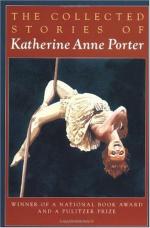|
This section contains 3,328 words (approx. 12 pages at 300 words per page) |

|
SOURCE: “Katherine Anne Porter, Politics, and Another Reading of ‘Theft,’” in Studies in Short Fiction, Vol. 30, No. 2, Spring, 1993, pp. 119–26.
In the following essay, Unrue provides a close reading of Porter's “Theft” in order to reveal “the extent to which politics was interwoven into Porter's concept and practice of art.”
When Katherine Anne Porter accepted the National Book Award in 1966 for her Collected Stories, she characterized herself as a “disappointed idealist.” Porter's habit of mind in assessing her life or in creating her art was to look through a lens of memory and see a harmonious whole,1 and that phrase, as well as any, summarizes Porter's political stances. At the age of 76, Porter was looking back on a life that had included numerous attachments to political movements, but attachments inevitably followed by disillusionment and rejection of the movements while still cherishing the underlying ideals. The phrase also points to...
|
This section contains 3,328 words (approx. 12 pages at 300 words per page) |

|


